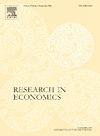Asymmetric connectedness among the G7 REITs market: How important are oil returns, climate policy uncertainty, and geopolitical risks?
IF 1.3
Q3 ECONOMICS
引用次数: 0
Abstract
This paper examines how global factors influence the asymmetric connectedness among G7 REITs markets. It hypothesizes that bearish markets may exhibit higher connectedness than bullish markets because people react more to losses than gains. Using the extended TVP-VAR model, the study estimates connectedness indexes under three market conditions across three samples: pre-crisis, crisis, and full sample. The findings reveal that REIT markets are more connected in bearish conditions than in bullish ones, even when connectedness was heightened during crises. Additionally, the study reveals that market conditions can alter risk and opportunity spillover structures among G7 REITs, making assets considered safe in one market risky in another, especially during crises. We further explain how geopolitical risks and climate policy uncertainty drive crude oil returns and how they collectively influence G7 REITs' connectedness. To achieve this, we employed both causality-in-quantile and quantile regression techniques. We found that these factors have a heterogeneous impact on total connectedness across market conditions, samples, and quantiles, offering valuable insights for policymakers and investors.
七国集团房地产投资信托基金市场之间的不对称联系:石油回报、气候政策不确定性和地缘政治风险有多重要?
本文研究了全球因素对七国集团REITs市场不对称连通性的影响。它假设看跌市场可能比看涨市场表现出更高的连通性,因为人们对损失的反应大于对收益的反应。利用扩展的tpv - var模型,本研究估计了三种市场条件下的连通性指数,包括三个样本:危机前、危机后和完整样本。研究结果显示,房地产投资信托基金市场在看跌时的关联度高于看涨时,即使在危机期间关联度有所提高。此外,研究表明,市场条件可以改变七国集团房地产投资信托基金之间的风险和机会溢出结构,使得在一个市场中被认为安全的资产在另一个市场中具有风险,尤其是在危机期间。我们进一步解释地缘政治风险和气候政策的不确定性如何推动原油回报,以及它们如何共同影响G7 REITs的连通性。为了实现这一点,我们采用了分位数因果关系和分位数回归技术。我们发现,这些因素对不同市场条件、样本和分位数的总连通性有异质影响,为政策制定者和投资者提供了有价值的见解。
本文章由计算机程序翻译,如有差异,请以英文原文为准。
求助全文
约1分钟内获得全文
求助全文
来源期刊

Research in Economics
ECONOMICS-
CiteScore
1.40
自引率
0.00%
发文量
37
审稿时长
89 days
期刊介绍:
Established in 1947, Research in Economics is one of the oldest general-interest economics journals in the world and the main one among those based in Italy. The purpose of the journal is to select original theoretical and empirical articles that will have high impact on the debate in the social sciences; since 1947, it has published important research contributions on a wide range of topics. A summary of our editorial policy is this: the editors make a preliminary assessment of whether the results of a paper, if correct, are worth publishing. If so one of the associate editors reviews the paper: from the reviewer we expect to learn if the paper is understandable and coherent and - within reasonable bounds - the results are correct. We believe that long lags in publication and multiple demands for revision simply slow scientific progress. Our goal is to provide you a definitive answer within one month of submission. We give the editors one week to judge the overall contribution and if acceptable send your paper to an associate editor. We expect the associate editor to provide a more detailed evaluation within three weeks so that the editors can make a final decision before the month expires. In the (rare) case of a revision we allow four months and in the case of conditional acceptance we allow two months to submit the final version. In both cases we expect a cover letter explaining how you met the requirements. For conditional acceptance the editors will verify that the requirements were met. In the case of revision the original associate editor will do so. If the revision cannot be at least conditionally accepted it is rejected: there is no second revision.
 求助内容:
求助内容: 应助结果提醒方式:
应助结果提醒方式:


